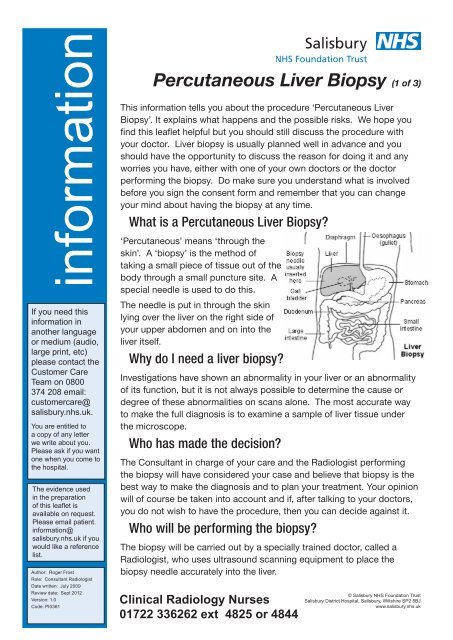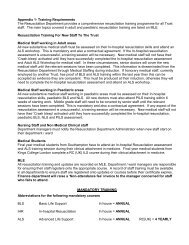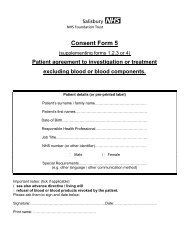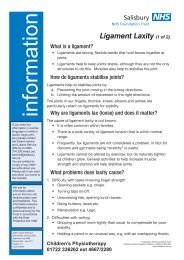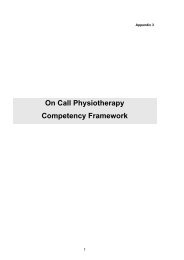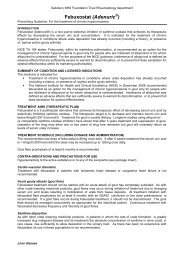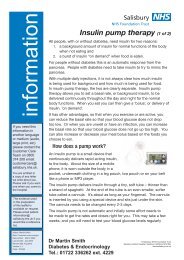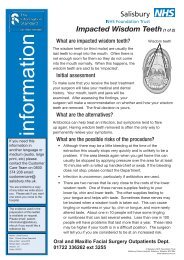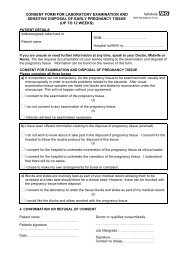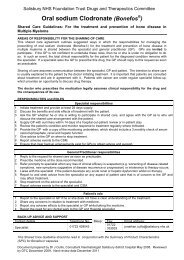Percutaneous Liver Biopsy - ICID - Salisbury NHS Foundation Trust
Percutaneous Liver Biopsy - ICID - Salisbury NHS Foundation Trust
Percutaneous Liver Biopsy - ICID - Salisbury NHS Foundation Trust
Create successful ePaper yourself
Turn your PDF publications into a flip-book with our unique Google optimized e-Paper software.
information<br />
<strong>Percutaneous</strong> <strong>Liver</strong> <strong>Biopsy</strong> (1 of 3)<br />
This information tells you about the procedure ‘<strong>Percutaneous</strong> <strong>Liver</strong><br />
<strong>Biopsy</strong>’. It explains what happens and the possible risks. We hope you<br />
find this leaflet helpful but you should still discuss the procedure with<br />
your doctor. <strong>Liver</strong> biopsy is usually planned well in advance and you<br />
should have the opportunity to discuss the reason for doing it and any<br />
worries you have, either with one of your own doctors or the doctor<br />
performing the biopsy. Do make sure you understand what is involved<br />
before you sign the consent form and remember that you can change<br />
your mind about having the biopsy at any time.<br />
What is a <strong>Percutaneous</strong> <strong>Liver</strong> <strong>Biopsy</strong>?<br />
‘<strong>Percutaneous</strong>’ means ‘through the<br />
skin’. A ‘biopsy’ is the method of<br />
taking a small piece of tissue out of the<br />
body through a small puncture site. A<br />
special needle is used to do this.<br />
If you need this<br />
information in<br />
another language<br />
or medium (audio,<br />
large print, etc)<br />
please contact the<br />
Customer Care<br />
Team on 0800<br />
374 208 email:<br />
customercare@<br />
salisbury.nhs.uk.<br />
You are entitled to<br />
a copy of any letter<br />
we write about you.<br />
Please ask if you want<br />
one when you come to<br />
the hospital.<br />
The evidence used<br />
in the preparation<br />
of this leaflet is<br />
available on request.<br />
Please email patient.<br />
information@<br />
salisbury.nhs.uk if you<br />
would like a reference<br />
list.<br />
Author: Roger Frost<br />
Role: Consultant Radiologist<br />
Date written: July 2009<br />
Review date: Sept 2012<br />
Version: 1.0<br />
Code: PI0361<br />
The needle is put in through the skin<br />
lying over the liver on the right side of<br />
your upper abdomen and on into the<br />
liver itself.<br />
Why do I need a liver biopsy?<br />
Investigations have shown an abnormality in your liver or an abnormality<br />
of its function, but it is not always possible to determine the cause or<br />
degree of these abnormalities on scans alone. The most accurate way<br />
to make the full diagnosis is to examine a sample of liver tissue under<br />
the microscope.<br />
Who has made the decision?<br />
The Consultant in charge of your care and the Radiologist performing<br />
the biopsy will have considered your case and believe that biopsy is the<br />
best way to make the diagnosis and to plan your treatment. Your opinion<br />
will of course be taken into account and if, after talking to your doctors,<br />
you do not wish to have the procedure, then you can decide against it.<br />
Who will be performing the biopsy?<br />
The biopsy will be carried out by a specially trained doctor, called a<br />
Radiologist, who uses ultrasound scanning equipment to place the<br />
biopsy needle accurately into the liver.<br />
Clinical Radiology Nurses<br />
01722 336262 ext 4825 or 4844<br />
© <strong>Salisbury</strong> <strong>NHS</strong> <strong>Foundation</strong> <strong>Trust</strong><br />
<strong>Salisbury</strong> District Hospital, <strong>Salisbury</strong>, Wiltshire SP2 8BJ<br />
www.salisbury.nhs.uk
Where will the biopsy take place?<br />
<strong>Percutaneous</strong> <strong>Liver</strong> <strong>Biopsy</strong> (2 of 3)<br />
The procedure will take place in the Radiology Department in one of the procedure rooms.<br />
The Radiology staff will try to make you as comfortable as possible.<br />
What do I need to do beforehand?<br />
Before your biopsy, you will have blood tests done to make sure your blood clots normally.<br />
Be sure to mention any medicines you take, especially those that affect blood clotting, like<br />
aspirin, anticoagulants such as Warfarin and especially the cardiac drug Clopidogrel. You<br />
will be asked not to eat anything for four hours before the biopsy and not to drink anything<br />
for two hours. Your doctor will tell you whether to take your regular medications during the<br />
fasting period and may give you other special instructions.<br />
What happens during a liver biopsy?<br />
In the scan room you will be asked to lie on your back on a hospital bed with your right<br />
hand above your head. After scanning your liver to determine the best site for the biopsy,<br />
the Radiologist will clean the skin with antiseptic to avoid infection. The skin and deeper<br />
tissues will be injected with local anaesthetic which will sting briefly before the tissues<br />
go numb. The Radiologist will make a small cut, then insert the biopsy needle to take a<br />
sample of liver tissue. Ultrasound may be used to guide the needle into the exact position<br />
for biopsy.<br />
How long will it take?<br />
The whole procedure takes between 15 and 20 minutes as positioning for the biopsy can<br />
take a little time. The biopsy itself however takes only a matter of seconds.<br />
Will it hurt?<br />
You will feel stinging as the local anaesthetic is given and then pressure on the skin as the<br />
biopsy needle is placed. Some people also feel some momentary discomfort as the needle<br />
enters the liver. You may feel discomfort after the biopsy has been taken, either in your<br />
right shoulder or in your stomach. This is quite common and you will be offered pain killers<br />
to relieve this discomfort. Do let the nursing staff know if it does not go away.<br />
What happens afterwards?<br />
After the biopsy has been taken you will be asked to lie on your right side for an hour and<br />
then on your back, but sitting up a little, for a further five hours. The nursing staff will take<br />
your pulse and blood pressure regularly. All being well, you will be allowed home after six<br />
hours. It is important that you have an adult with you on the first night after the biopsy and<br />
that you are able to return to hospital if necessary. Do not expect to get the result of the<br />
biopsy before you leave, as it always takes a few days to do all the necessary tests on the<br />
biopsy specimen.<br />
Clinical Radiology Nurses<br />
01722 336262 ext 4825 or 4844<br />
© <strong>Salisbury</strong> <strong>NHS</strong> <strong>Foundation</strong> <strong>Trust</strong><br />
<strong>Salisbury</strong> District Hospital, <strong>Salisbury</strong>, Wiltshire SP2 8BJ<br />
www.salisbury.nhs.uk
What are the risks and complications?<br />
<strong>Percutaneous</strong> <strong>Liver</strong> <strong>Biopsy</strong> (3 of 3)<br />
<strong>Percutaneous</strong> liver biopsy is in general a very safe procedure but some risks and<br />
complications can still arise. The most common complication is pain after the procedure, as<br />
described above, which may take several hours to settle.<br />
Bleeding is usually minimal and of short duration, but instances of more serious bleeding<br />
can occur and this may lead to development of a large ‘bruise’, either in or around the liver<br />
or by leakage of blood into the abdominal cavity. If the bleeding is serious then a further<br />
radiological procedure or an operation may be needed, but this is very rare.<br />
Is there any alternative treatment?<br />
There is no radiological alternative.<br />
Finally...<br />
Hopefully some of your questions will have been answered by this leaflet, but remember<br />
that this is only a starting point for discussion about your treatment with the doctors looking<br />
after you. Make sure you are satisfied that you have received enough information about the<br />
procedure, before you sign the consent form.<br />
<strong>Percutaneous</strong> biopsy is a very safe procedure, designed to save you having a larger<br />
operation. There are some slight risks and possible complications involved, but these are<br />
generally minor and do not happen very often.<br />
Where can I get more information?<br />
Useful websites<br />
www.goingfora.org<br />
www.patient.co.uk.<br />
You may also contact the Radiology Nurses on: 01722 336262 extension 4825 or 4844.<br />
Clinical Radiology Nurses<br />
01722 336262 ext 4825 or 4844<br />
© <strong>Salisbury</strong> <strong>NHS</strong> <strong>Foundation</strong> <strong>Trust</strong><br />
<strong>Salisbury</strong> District Hospital, <strong>Salisbury</strong>, Wiltshire SP2 8BJ<br />
www.salisbury.nhs.uk


